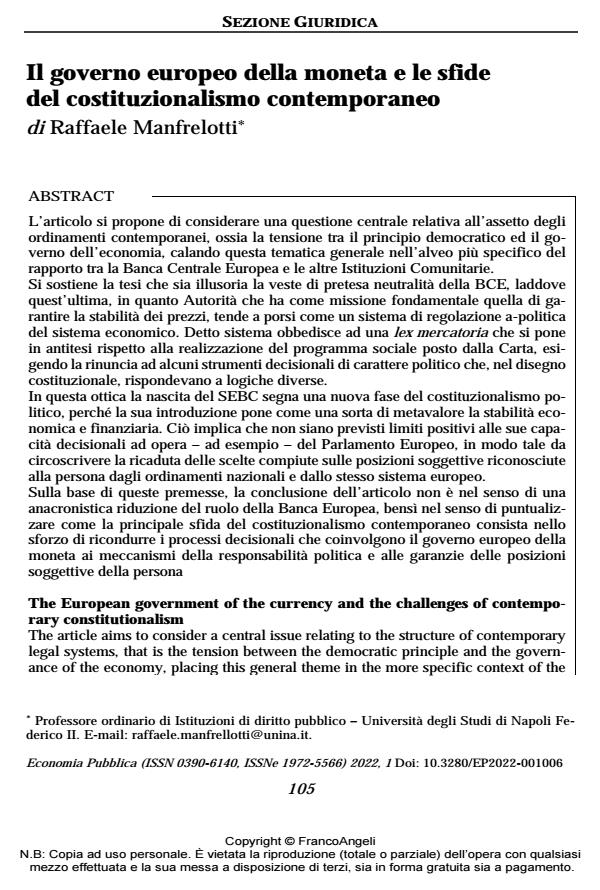The European government of the currency and the challenges of contemporary constitutionalism
Journal title ECONOMIA PUBBLICA
Author/s Raffaele Manfrelotti
Publishing Year 2022 Issue 2022/1
Language Italian Pages 11 P. 105-115 File size 54 KB
DOI 10.3280/EP2022-001006
DOI is like a bar code for intellectual property: to have more infomation
click here
Below, you can see the article first page
If you want to buy this article in PDF format, you can do it, following the instructions to buy download credits

FrancoAngeli is member of Publishers International Linking Association, Inc (PILA), a not-for-profit association which run the CrossRef service enabling links to and from online scholarly content.
The article aims to consider a central issue relating to the structure of contempo-rary legal systems, that is the tension between the democratic principle and the governance of the economy, placing this general theme in the more specific con-text of the relationship between the European Central Bank and the other Community Institutions. The thesis is supported that the purported neutrality of the ECB is illusory, whereas the latter, as an Authority whose fundamental mission is to guarantee price stability, tends to act as an a-political regulation system of the economic system. This system obeys a lex mercatoria which is antithetical to the imple-mentation of the social program set by the Charter, requiring the renunciation of certain decision-making instruments of a political nature which, in the constitu-tional design, responded to different logics. In this perspective, the birth of the ESCB marks a new phase of political constitutionalism, because its introduction places economic and financial stability as a sort of meta-value. This implies that there are no positive limits to his decision-making abilities by - for example - the European Parliament, in such a way as to limit the impact of the choices made on the subjective positions recognized to the person by national legal systems and by the European system itself. On the basis of these premises, the conclusion of the article is not in the sense of an anachronistic reduction of the role of the European Bank, but in the sense of pointing out that the main challenge of contemporary constitutionalism consists in the effort to bring back the decision-making processes involving the European government of money to the mechanisms of political responsibility and the guarantees of the subjective positions of the person
Keywords: role of the ECB, economic governance, contemporary constitutionalism
Jel codes: K20
Raffaele Manfrelotti, Il governo europeo della moneta e le sfide del costituzionalismo contemporaneo in "ECONOMIA PUBBLICA " 1/2022, pp 105-115, DOI: 10.3280/EP2022-001006